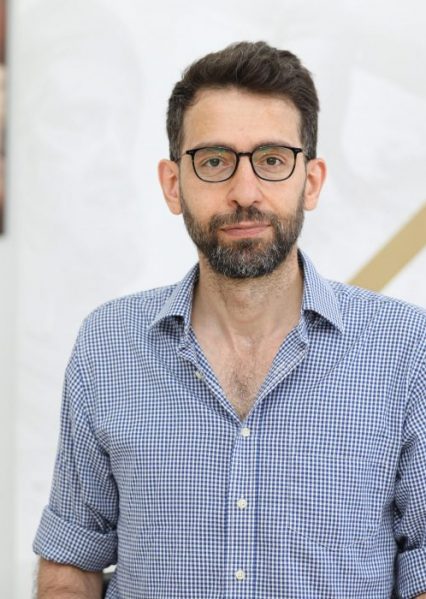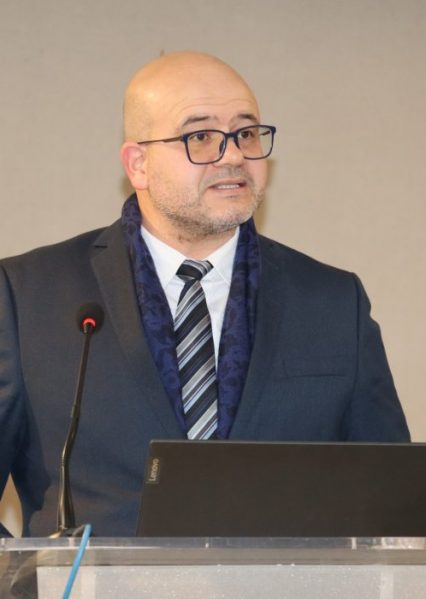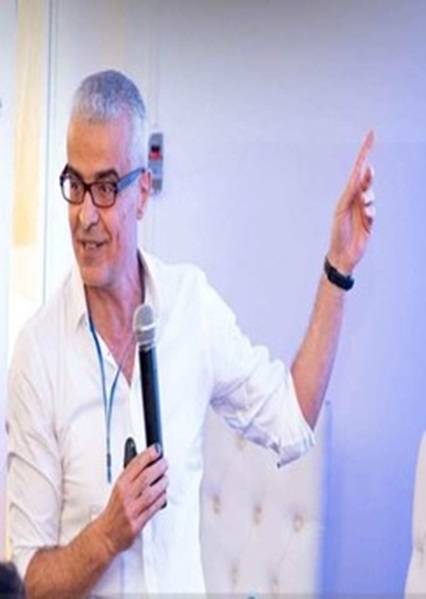Jedes Jahr bietet MECAM drei Wissenschaftler*innen aus seinem Netzwerk an, im Rahmen des Programms „Germany Research Visits” für maximal drei Monate an eine seiner deutschen Partnerinstitutionen zu kommen. Hierdurch bietet sich ihnen die Möglichkeit, ihre Forschung einem neuen Publikum zu präsentieren, lokale Infrastrukturen zu nutzen und ihre Netzwerke zu erweitern.
Dr. Imad Alsoos
Datum des Aufenthalts: 1. Mai 2025 bis 31. Juli 2025 (GIGA Institute for Middle East Studies, Hamburg)
Imad Alsoos ist Stipendiat der Gerda Henkel Stiftung und führt eine vergleichende Studie zum muslimischen politischen Denken in Maschrek und Maghreb durch. Er untersucht, wie deren Interaktionen die Entwicklung des politischen Denkens der Ennahda-Partei in Tunesien beeinflusst haben. Zwischen 2023 und 2025 forschte er am MECAM über die Ennahda-Partei in Tunesien. 2017 promovierte er an der Freien Universität Berlin über den politischen Diskurs und die organisatorische Mobilisierung der Hamas im Gazastreifen. Zwischen 2018 und 2023 forschte er am Max-Planck-Institut für ethnologische Forschung zur Hamas.
Aktivitäten:
- Vortrag zum Thema „Genealogies of Muslim Political Thought in Mashreq and Maghreb: The Case of Ennahda’s Muslim Democracy” im Rahmen des IMES-Kolloquiums (GIGA Institute for Middle East Studies) (23 July 2025)

Während des Forschungsaufenthaltes bearbeitetes Projekt:.
This research project conducts a comparative study of Muslim thoughts in Mashreq and Maghreb and then examines the way their interactions have influenced the development of Ennahda Party’s political thought. Ennahda has evolved from a sharia-based approach (1969-1979), through an umma-based approach or Islamic democracy (1981-2010) to a Muslim democracy (ca.2011-present). The latest development represents the most advanced Muslim political thought in terms of the relationship between Islam and the modern model of state and civil society. Tracing Ennahda’s development demands an exploration of the movement’s historical and philosophical origins and the ways in which they have been renegotiated and transformed to adapt to the Tunisian political context. In theoretical and methodological terms, my research builds on Ibn Khaldun and Michael Foucault’s genealogical perspective, which argues that the cross-generational transfer of knowledge has neither a defined beginning nor a linear evolution. As such, Muslim democracy has emerged as a result of disparities between events, actors, unplanned situations and Ennahda’s own agency, which is conditioned by local context.

Dr. Riadh Ben Khalifa
Datum des Aufenthalts: 1. – 16. Juli (Forum Transregionale Studien, Berlin)
Riadh Ben Khalifa ist Associate Professor für Zeitgeschichte an der Université de Tunis, Prodekan und Praktikumsleiter an der Fakultät für Human- und Sozialwissenschaften (seit September 2024). Darüber hinaus ist er Mitglied mehrerer Migrationsnetzwerke. Er ist Chefredakteur der tunesischen Zeitschrift für Sozialwissenschaften. Seine Forschungsinteressen umfassen Migration, Asyl und Mobilität in Übergangskontexten.
Aktivitäten:
- Vortrag zum Thema „Historiography of migration in Tunisia: The case of refugees” im Rahmen des vom Forum Transregionale Studien and Centre Marc Bloch organisierten Workshops „Diasporas, Exiles, Migrants, and Refugees from Europe in the Middle East and North Africa” (July 8-10, 2025)
Während des Forschungsaufenthaltes bearbeitetes Projekt:
My study examines protection systems for child and youth migrants in Tunisia after 2011, within the context of economic crisis, political instability, and growing hostility toward migrants. Although Tunisia has developed a pioneering legal framework for child protection -starting with the 1956 Personal Status Code, the ratification of the Convention on the Rights of the Child in 1991, and the 1995 Child Protection Code – the extension of these rights to migrants remains ambiguous, leaving them highly vulnerable.
The education system, once a driver of social mobility, now reproduces inequalities across regions, socio-economic levels, and gender, with migrant children particularly disadvantaged.Various actors are involved in protection, including ministries, public authorities such as the National Authority for the Fight Against Human Trafficking, and civil society organizations (CSOs). CSOs and international agencies play a vital role in denouncing rights violations, advocating for reforms, and pushing for inclusive policies. Their efforts contributed to the adoption of key laws, such as those against racial discrimination (2018) and human trafficking (2016). Nevertheless, Tunisia’s crisis-ridden context, combined with restrictive labor laws, forces many migrants into informal work. The 2021 trafficking report revealed that over half of identified victims were children, most of them foreigners and women. In sum, Tunisia possesses an advanced child protection framework, but its implementation remains weak. Strengthening collaboration between state institutions, civil society, and international partners is essential to ensure effective protection and inclusion of child and youth migrants.
This research stay enabled me to finalize a scientific article by deepening the analysis of the legal and institutional framework for the protection of child and youth migrants in Tunisia and to compare with other experiences. The findings from this research will contribute to an article that I plan to publish in a collective volume. Furthermore, an interview related to this work will be conducted for the Blog for Transregional Research (Trafo) to share preliminary insights and open the discussion to a wider academic audience.
Dr. Adel Karaa
Datum des Aufenthalts: 19. November 2023 bis 22. Dezember 2023 (Philipps-Universität Marburg)
Dr. Adel KARAA ist Professor für quantitative Methoden am Higher Institute of Management der Universität Tunis, sowie Mitglied des nationalen Rekrutierungskomitees der ordentlichen und außerordentlichen Professoren für quantitative Methoden in Tunesien. Des Weiteren ist er Direktor der Graduate School of Management Science and Management Computing des ISGT-ESSECT-TBS der Universität Tunis.
Aktivitäten:
- Vortrag zum Thema „Towards an Integrated Model of the Mediating Effect of the Process of Individual Perceptions on the Relationship between Job Quality and Mobility Intentions” im Rahmen des MACIE Research Seminars (Marburg Center for Institutional Economics) (30. November 2023)
Während des Forschungsaufenthaltes bearbeitetes Projekt:
Do better employment conditions reduce migration and professional mobility intentions among higher graduate workers in Tunisia? An integrated model of real and perceived job quality.

The aim of this research is to establish an analytical framework for a better comprehension of the phenomena of migration and occupational mobility (turnover), which are increasingly prevalent among young graduates in Tunisia. Faced with the general deterioration in working conditions and job quality in the country, many of young graduates are more and more enticed to seek opportunities elsewhere in the hope of finding better living conditions.
Based on individual data from a survey of a representative sample of 814 higher education graduates working in various sectors and covering all regions of Tunisia, the study used an appropriate theoretical and empirical approach to develop an integrated model that schematically represents the process of managing individual career trajectories in the face of the diverse working conditions and job quality. By retaining a wide range of characteristics (salary, type of contract, social security cover, working conditions, holidays, health insurance, working hours, etc.), empirical investigations have revealed the high degree of heterogeneity in the jobs held by young graduates. In this respect, a typology of jobs is established, showing the existence of five categories that differ according to employment status (salaried vs. self-employed), degree of informality and quality of (environment) working conditions.
The estimated results of the aforementioned model corroborate also the mediating role of the cognitive, affective and emotional dimensions in the relationship between the type of occupation (i.e. objective dimension) and the mobility intentions (i.e. conative dimension) among young graduate workers in Tunisia. One of the main practical implications of this research suggests the need for intervention policies aimed at improving employment conditions, workplace quality and organizational practices that are supportive of employee well-being.

Dr. Elizabeth Bishop
Datum des Aufenthalts: 1. Oktober 2023 bis 30. November 2023 (Philipps-Universität Marburg)
Dr. Elizabeth Bishop kam 2008 mit einem Doktortitel von der University of Chicago an die Geschichtsfakultät des Bundesstaates Texas. Sie unterrichtet Bachelor- und Masterkurse in ihren wissenschaftlichen Fachgebieten – der Geschichte des Nahen Ostens, der postkolonialen arabischen Geschichte, sowie der Geschichte des globalen Kalten Krieges. Zugang zu ihrem ausführlichen Profil finden Sie hier.
Aktivitäten:
- Konversation mit Diana Abbani im TRAFO Blog for Transregional Research unter dem Titel “Arab Engagement at the World Festival of Youth and Students in the USSR in 1957 – A Conversation with Elizabeth Bishop” (15. April 2024)
- Vortrag zum Thema „Ghosts of Empire in Algeria and Egypt” im Rahmen des Seminars „Comparative History of Ottoman and European Imperialism” (Nessim Znaien) (8. November 2023)
- Vortrag zum Thema „Cholera and Colonialism in the Maghrib: 1830-1837″ im Rahmen des Seminars „History of the Epidemic, Hygiene and Care in the Maghreb” (Nessim Znaien) (15. November 2023)
Während des Forschungsaufenthaltes durchgeführtes Projekt:
Under the slogan, “with diplomas, we will not make better corpses”, the UGEMA (L’Union générale des étudiants musulmans algériens) called an indefinite strike for 19 May 1956; this strike marked a turning point in Algeria’s national liberation struggle; with (and without) diplomas, organizers of the students’ strike became leaders for the new nation, eventually serving as cabinet ministers, diplomats, and general directors for the state petroleum company after independence. Understanding MECAM’s primary aim is to create a high-quality and flexible setting for peer-to-peer exchange and debate, I would complete revisions on a monograph regarding UGEMA which was active between 1955 and 1962. Research on this student organization after World War II relates directly to MECAM’s guiding theme “Imagining Futures: Dealing with Disparity” because the population estimate of 1955 introduced a term (“Français d’origine algérienne”) which represented a form of institutionalized disparity, and these students’ struggle for legal recognition brought them into the “imagined future” of the Front de libération nationale (FLN), which culminated in recognition of a République algérienne démocratique et populaire (RADP). Research on UGEMA also relates directly to MECAM’s IFG V, “Identities and Beliefs” because the students attained their legal status through France’s Law of Associations (1901), that guaranteed their administrative autonomy based on their cultural identity.
